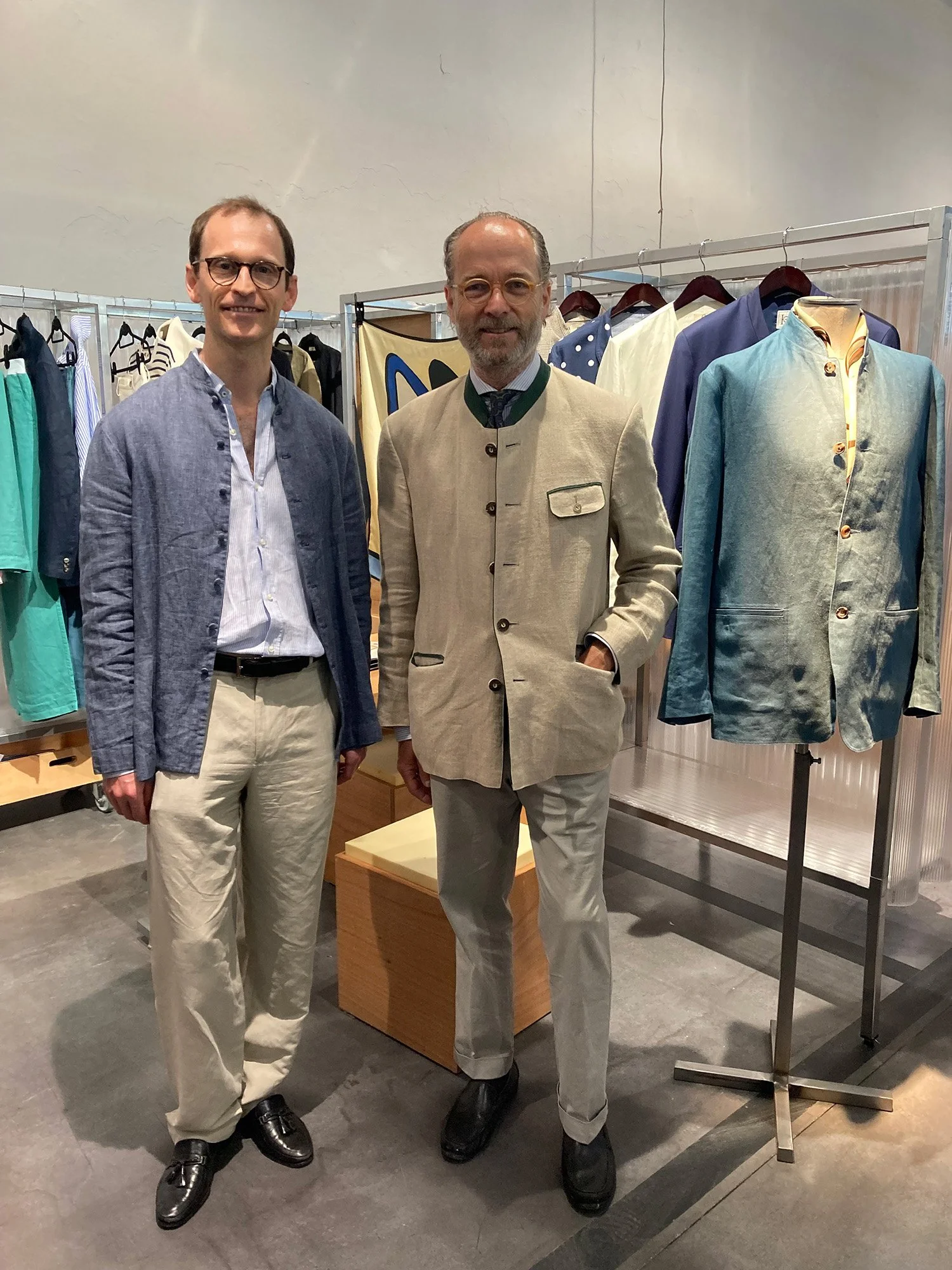Getting sweaty at Pitti (Uomo)
There’s an unnerving moment when you cross from darkness into light, when the world turns its gaze towards you, and there’s nowhere to hide…
Heron’s Ghyll stepped into that light at the 104th edition of the Pitti Uomo trade fair in June 2023—an unfamiliar glow, both harsh and inviting. For years, the brand had moved quietly in the shadows, constructing itself in solitude, away from the noise. But standing among giants, the air felt different. The weight of expectation pressed down, yet there was no turning back. This was the leap—stepping forward into the unknown, the moment that defines everything. Each stitch, each poorly sewn button (dammit Niki!), now visible, laid bare for all to see…
A knot of existential dread settled in my stomach in the days leading up to the fair, one I couldn’t shake. The thought of withdrawing crossed my mind more than once, but my Asian upbringing meant that I was too much of a cheapskate to forfeit the deposit. Defeat I could live with—wasting money, not so much.
I’ve always found something vulgar in the act of selling—a crude ritual in the temple of capitalism. Naturally, our clothes are exceptional; I know this because I made them. And yet, I remain bewildered that our website hasn’t buckled under the weight of customers eager to get their hands on a Heron’s Ghyll suit. I had assumed that quality spoke for itself, that great design required no fanfare. It seems, however, that the world occasionally needs a gentle nudge.
I kept picturing myself as one of those overly enthusiastic salespeople hawking sample cups of juice in supermarkets, or like the Save the Children volunteers on the streets of Islington, desperately trying to get passersby to stop and listen. I suddenly felt a pang of sympathy—for them, for us. We were all in the business of trying to make eye contact with people who just wanted to avoid us.
Eventually, the day arrived, and so did we, in Florence. While others arrived with fanfare and poise, we… dragged our luggage over the cobblestones like cattle farmers wrangling a stubborn herd, grunting and heaving as our suitcases caught in every groove. The sun, unsparing, only added to the effect—by the time we reached the entrance of the Fortezza da Basso, any hope of looking composed had evaporated entirely.
The scene outside the Fortezza was a chaotic symphony of trucks honking, men barking orders, and a sea of lanyard-clad fashion insiders marching with enviable purpose. Meanwhile, I was a flustered mess, nearly tripping over my own feet as a Very Important Brand van whizzed by, mocking me with its seamless efficiency.
The only image of myself I found on one of those street style Instagrams was not as the main subject but far in the background—pit stains visible, hair looking decidedly disheveled, as if I’d just survived a minor disaster. I believe they call it sprezzatura.
There’s something about fashion’s biggest stage that can make you feel small, and not in an existential sense. It’s tangible. Starting a brand in lockdown had shielded us from the realities of the industry—there were no crowds, no packed schedules, no endless rooms filled with people who have “seen it all.” It was just us and our ideas. But now, at Pitti, I felt every inch of the space between where we stood in the Sala delle Nazioni and where the heavyweights operated in the Padiglione Centrale. The inner voice whispered: You’re out of your depth, homie.
But here’s the thing about standing in the light. It’s harsh, yes, but it’s also where you’re seen for what you are. It forces you to show up. To hold your own. So we did what we always do—kept moving forward, hoping that the pieces we’d poured everything into would speak louder than our nerves.
Excuse the wrinkles; steamers were in short supply.
The fair itself passed in a surreal haze. Booths were polished to perfection, brands looked like they’d been here for centuries, and yet… somewhere amidst all of it, we found our footing. Each time someone stopped by to see our collection, the imposter syndrome faded a little. There’s something about explaining the story behind a garment you’ve obsessed over that pulls you back to center.
There were a few moments that stood out, reminding us we weren’t alone in this wilderness. Meeting other independent, founder-led brands like Gusari, LESSLESS, Maison Audmi, and ROVI Lucca was one of them. There’s something about entrepreneurship that can feel like walking through fog—no clear markers, no guideposts. But here were people navigating the same uncertainties, facing the same doubts. And for the first time, I realized there’s a kind of strength in knowing others are on the same road, even when it feels like no one else is.
And then, on Day 1, we had our own brush with legend. There he was, strolling past our booth: silver hair impeccably slicked, tortoiseshell glasses resting with effortless grace, wearing a trachten jacket that looked regal. Ned and I exchanged a glance—the kind that said, who is this man? Later, we discovered his name: Bernhard Roetzel. Yes, that Bernhard Roetzel. Author of Gentleman: A Timeless Fashion. He stopped by, we chatted, and then something unexpected happened—he endorsed us and made introductions that we hadn’t dared hope for. Later, he even featured us on his blog, turning what felt like an offhand encounter into something that would carry far beyond the booth. It wasn’t just validation; it was a reminder that sometimes, you’re seen by the right people when you least expect it.
Ned wearing the Blue Textured Linen Nehru Jacket with Bernhard Roetzel.
The moments of doubt still lingered throughout the fair, as they always do, but they were quieter now. Less insistent. Each day at Pitti was a mix of exhilaration and exhaustion—meeting people who had built empires and those, like us, who were just beginning to lay the foundations.
By the end of it, we hadn’t conquered the industry, but that wasn’t the point. We had shown up.



